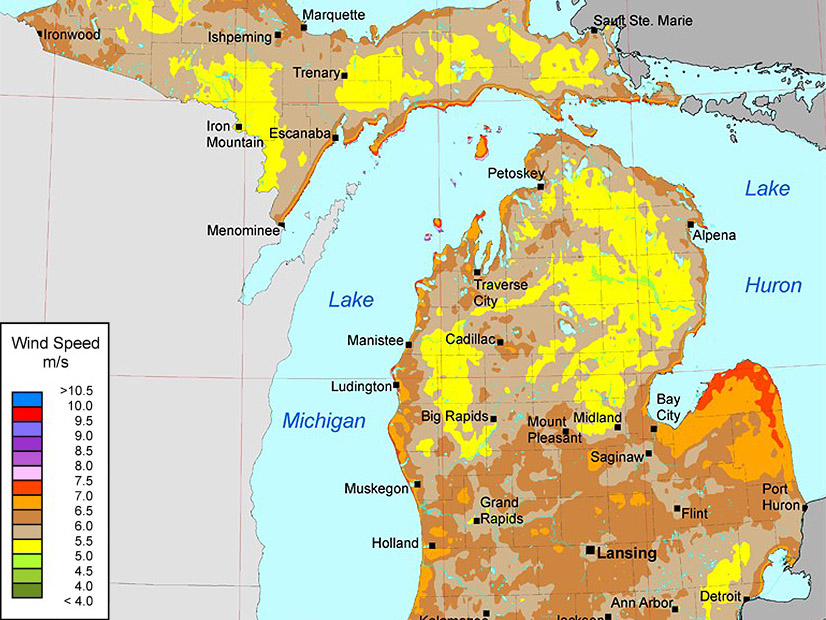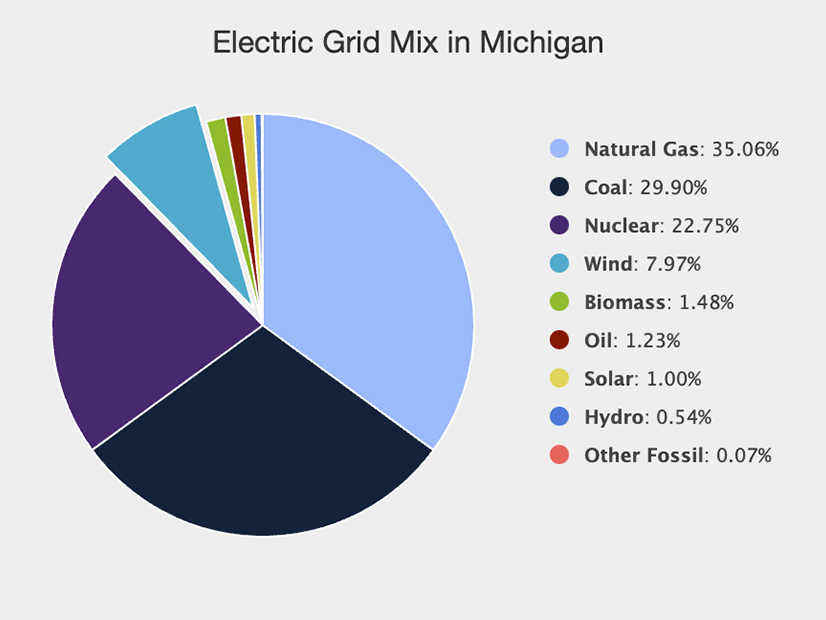Bills setting a 100% clean energy standard and giving state regulators siting authority over wind and solar projects are headed to Michigan’s governor.
LANSING, Mich.— Legislation requiring Michigan to meet a 100% clean energy standard by 2040 and giving state regulators siting authority for large wind and solar energy projects is headed to Gov. Gretchen Whitmer (D).
The Michigan Legislature completed work on the siting bills, HB 5120 and HB 5121, on Nov. 8, with the Senate’s approval on a 20-18 vote with only Democrats in support.
Last week, lawmakers — again with just Democratic support — approved a package of bills:
-
- SB 271 requires electric providers to achieve a clean energy portfolio of at least 80% and 100% in 2040. It also sets a statewide energy storage procurement target of 2,500 MW and increases the cap on distributed generation such as rooftop solar to 10%.
- SB 273 requires utilities to boost their energy-efficiency savings from 1% to 1.5%.
- SB 502 requires the PSC to consider environmental justice, climate, affordability and reliability in its decisions on utility integrated resource plans.
- SB 519 creates a Community and Worker Economic Transition Office in the Department of Labor and Economic Opportunity to help retrain auto, energy and construction workers who lose jobs because of the switch to electric vehicles and efforts to reduce greenhouse gas emissions.
- SB 277 codifies an existing state rule allowing farmers to remain enrolled in the state farmland preservation program even if they rent their land for solar farms.
According to the Clean Energy States Alliance, Michigan will become the 16th state to legislate 100% clean energy goals.
In 2022, Michigan got almost 23% of its electricity from nuclear power and another 9.5% from wind, solar and hydropower, according to the Energy Information Administration.
Whitmer issued a statement indicating she would sign the bills, which she said makes Michigan “a national leader on clean energy.”
“These bills will help us make more clean, reliable energy right here in Michigan, creating tens of thousands of good-paying jobs, and lowering utility costs for every Michigander by an average of $145 a year,” she said. “Getting this done will also reduce our reliance on foreign fuel sources, while protecting our air, water and public health.”
Environmental groups criticized legislators for changing the 100% deadline from 2035 and defining landfill gas and incinerated waste as renewable energy. They also criticized allowing generators to continue using natural gas-fired generation after 2040 if they include carbon capture systems.
But clean energy advocates were generally pleased with the final products. Lisa Wozniak, executive director of the Michigan League of Conservation Voters, said the bills puts Michigan among the top of all states in pushing for energy conservation.
Derrell Slaughter, with the Natural Resources Defense Council, said the bills will help cut energy costs for state residents after “being plagued for decades with the worst service and highest rates” in the Midwest.
The entire package has been controversial, with Republican opponents charging that Michigan residents will face higher energy costs and less reliability. The Mackinac Center for Public Policy, a conservative think tank based in Midland, argued that even if all the energy savings requirements go into effect, they will have little effect on curbing climate change.
Most controversial were the siting bills, with both local government organizations and agricultural interests opposing them. Local government groups argued the measures were a state overreach on local decision-making and would deny local residents any say in how local property is developed. Agricultural groups charged the measures would reduce the amount of land being used for farming. (See Mich. Energy Siting Bills Set off Opponents and Backers.)
But disputes over permitting new wind and solar projects in primarily rural areas led lawmakers to draft the measure giving the state Public Service Commission authority over siting of solar projects of 50 MW or more, wind facilities of 100 MW or more and energy storage facilities of at least 50 MW with a discharge capacity of 200 MW or more.
PSC Chair Dan Scripps testified Nov. 7 before a Senate committee that the siting rules must change for the state to meet its climate goals. He said the state would need up to 209,000 acres of additional wind and solar — “a big number,” he acknowledged, but only 0.55% of the state.
There has been no indication of how opponents might try to block the package. The Legislature did not appropriate any funding in the bills to enact the proposals, which means under Michigan’s constitution opponents could try to hold a voter referendum on the bills. But the petition requirements — directing that a sufficient number of petition signatures be collected and certified by the state before the bills take effect — make that a tough hurdle to overcome.
A court challenge to the constitutionality of the provisions is possible, but no group has so far suggested a suit is coming.
Because only Democrats supported the bills, they will not go into effect immediately after they are signed by Whitmer. However, the Legislature is planning on adjourning sine die some six weeks earlier than usual, which means the bills could go into effect by February.





